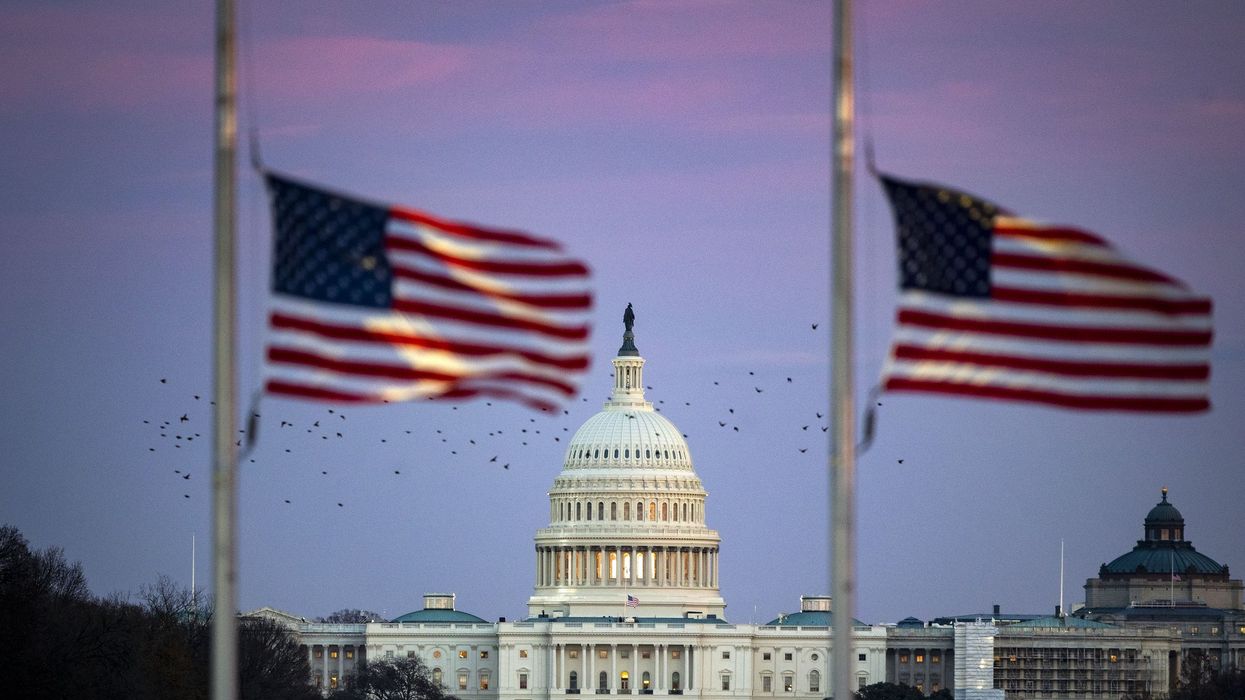The Fulcrum introduces Congress Bill Spotlight, a weekly report by Jesse Rifkin, focusing on the noteworthy legislation of the thousands introduced in Congress. Rifkin has written about Congress for years, and now he's dissecting the most interesting bills you need to know about, but that often don't get the right news coverage.
The American flag at the Capitol Building almost flew at half-staff during Trump’s inauguration. Should that be allowed?
The Bill
The Honor Inauguration Day Act would require the American flag be flown at its highest peak, never half-staff, on a presidential inauguration day.
The House bill was introduced on January 13 by Rep. Monica De La Cruz (R-TX15). No Senate companion version appears to have been introduced yet.
Context
Following the death of a president or former president, the American flag is required to fly at half-staff for 30 days at all federal buildings and facilities. One of the most prominent such federal buildings is the U.S. Capitol.
When former President Jimmy Carter died on December 29, 2024, that meant the flag was supposed to fly at half-staff until January 28, 2025. That period would have included Donald Trump’s presidential inauguration at the Capitol on January 20.
Trump protested this possibility. “The Democrats are all giddy about our magnificent American flag potentially being at ‘half mast’ during my Inauguration,” Trump posted to Truth Social on January 3. “Nobody wants to see this, and no American can be happy about it. Let’s see how it plays out.”
How it actually played out: Speaker Mike Johnson (R-LA4), who only had authority over the U.S. Capitol Building, ordered flags raised there on January 20 only. It almost didn’t happen, though—the weather in D.C. was so cold that particular morning that the flags’ cords froze.
Shortly after taking office, Trump ordered that the American flag be raised for the rest of the day at all federal facilities, from the White House to embassies overseas. He ordered flags lowered back to half-staff in Carter’s memory once again from January 21 to 28.
While Trump’s proclamation declared it the new policy “on this and all future inauguration days,” that’s not actually codified in federal law, so it could be instantly overturned by a future president. Thus, this bill from Congress.
What Supporters Say
Supporters argue that on a day intended for happiness and unification, the flag shouldn’t be flown in a position of sorrow and mourning.
“President Biden has decided… to fly the flag at half-staff during a successor's inauguration. Meaning, when President Trump is sworn in, the flag will not be fully raised,” Rep. De La Cruz said in a press release. “Inauguration Day celebrates the will of the American people and their sacred right to vote and determine their own governance. It is not a day for the flag to be at half-staff.”
What Opponents Say
Opponents counter that the 30-day tradition has always been followed. Indeed, during Richard Nixon’s second inauguration in 1973, flags at the Capitol flew at half-staff for former President Harry S. Truman’s death a few weeks prior. Eerie photos show the bizarre visual of an inauguration with half-staff flags waving, a sight seen neither before nor since.
Biden’s White House Press Secretary Karine Jean-Pierre was asked whether Biden would unilaterally act to raise the flags on January 20. She replied with one word: “No.”
Odds of Passage
The bill has attracted 17 cosponsors, all Republicans. It awaits a potential vote in the House Judiciary Committee, controlled by Republicans.
Jesse Rifkin is a freelance journalist with the Fulcrum. Don’t miss his weekly report, Congress Bill Spotlight, every Friday on the Fulcrum. Rifkin’s writings about politics and Congress have been published in the Washington Post, Politico, Roll Call, Los Angeles Times, CNN Opinion, GovTrack, and USA Today.
SUGGESTIONS:
Congress Bill Spotlight: Panama Canal Repurchase Act
Congress Bill Spotlight: Make Greenland Great Again Act
Congress Bill Spotlight: BIG OIL from the Cabinet Act
Congress Bill Spotlight: renaming Gulf of Mexico as “Gulf of America”
Congress Bill Spotlight: constitutional amendment letting Trump be elected to a third term
Congress Bill Spotlight: adding Donald Trump’s face to Mount Rushmore
Congress Bill Spotlight: BAD DOGE Act
Congress Bill Spotlight: Repealing Trump’s National Energy Emergency




















Trump & Hegseth gave Mark Kelly a huge 2028 gift